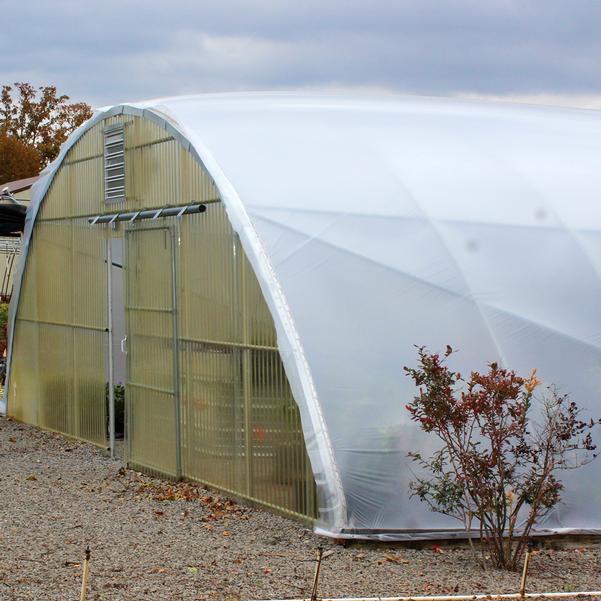
Tips for Winter Protecting your Plants
The Sooner Plant Farm Team desires and cares that you have highest level of success when purchasing and planting our plants. We want to mention some of the steps that can be taken to protect your plants from extreme cold temperatures.
First, plants have the natural ability to protect themselves by going into dormancy. This is also referred to as "being hardened off". This is a slow process that begins in fall when temperatures start to drop. During this time, the moisture within the top portion of a plant is transferred to the root system.
Two things are happening to your plant as this is progressing. First, the lack of excess water in the stems keeps the plant cells from exploding when they freeze. This is like what happens with water pipes. If the pipe is full and freezes, it bursts the pipe, whereas if the pipe is drained or has very little water in it, it won't freeze solid and burst. Secondly, the water that contains plant sugars or starches is stored in the roots and is used to nourish the plant next spring.
Since plants naturally have the ability to protect themselves when experiencing normal winter conditions, we don’t have to worry too much about them. However, it is when conditions are not normal when problems can occur. Plants that are planted outside of their recommended cold hardiness zone can and will experience problems and possibly failure due to them not being able to survive normal conditions outside of their zone. Also, plants that are planted within their recommend hardiness zone can experience problems if the temperatures fall below what is normal for that zone. This is where extra efforts to protect your plants have the potential to pay off.
Please note that root systems are generally two zones less cold hardy than the above ground part of the plant. Protecting the roots with up to 3-4 inches of mulch can help buffer cold temperatures and reduce the range of temperature extremes.
There are many new plants introduced each year, and unfortunately extensive cold hardiness testing may not exist for many of them. As plant breeders create new cultivars that produce more aesthetically pleasing characteristics, such as more attractive flowers, other characteristics like cold hardiness can be compromised. This occurs because a new plant can spend all its energy producing beautiful flowers, and the energy that would normally be spent producing leaves may not develop a plant that is as sturdy as the naturally occurring species.
Plants that have been growing in your garden for many years will most likely survive anything thrown at them as they have adapted to your environmental conditions.
Tips to help protect your plant(s) during winter.
- Most importantly, make sure the soil has moisture. Even though the plant is not growing, roots will dehydrate and die if the surrounding soil has less moisture than the roots; this is known as freeze drying.
- Protect landscape plants during extreme cold spells with rigid structures, such as large buckets or plastic boxes. Do not wrap the plant or tree with plastic, as this will actually do more harm to the stems or branches that come into contact with the plastic. A cloth blanket or sheet will work much better. Keep in mind that if snow or ice is in the forecast, and if it builds up on covered plants, it can weight them down resulting in breakage.
- Bring deck or containerized plants into a cool garage or shed for protection, while still protecting from freezing temperatures indoors.
- A layer of snow covering a plant is good insulation from extreme temperatures and wind.
- Avoid pruning in early spring until you are sure freezing temperatures are over for your area. Early spring pruning will trigger plants into growing as soon as temperatures begin to warm. This can cause sugars and starches to be transferred to stems, which can freeze cells and damage or kill plants.
- Keep evergreen plants, such as arborvitaes, boxwoods, Junipers, and hollies well-watered throughout the winter as they always need moisture.
The Sooner Plant Farm Team hope this helps your plants survive this winter. If you have any questions regarding overwintering or any other issue, please feel free to contact us and we will do our best to answer your questions.
